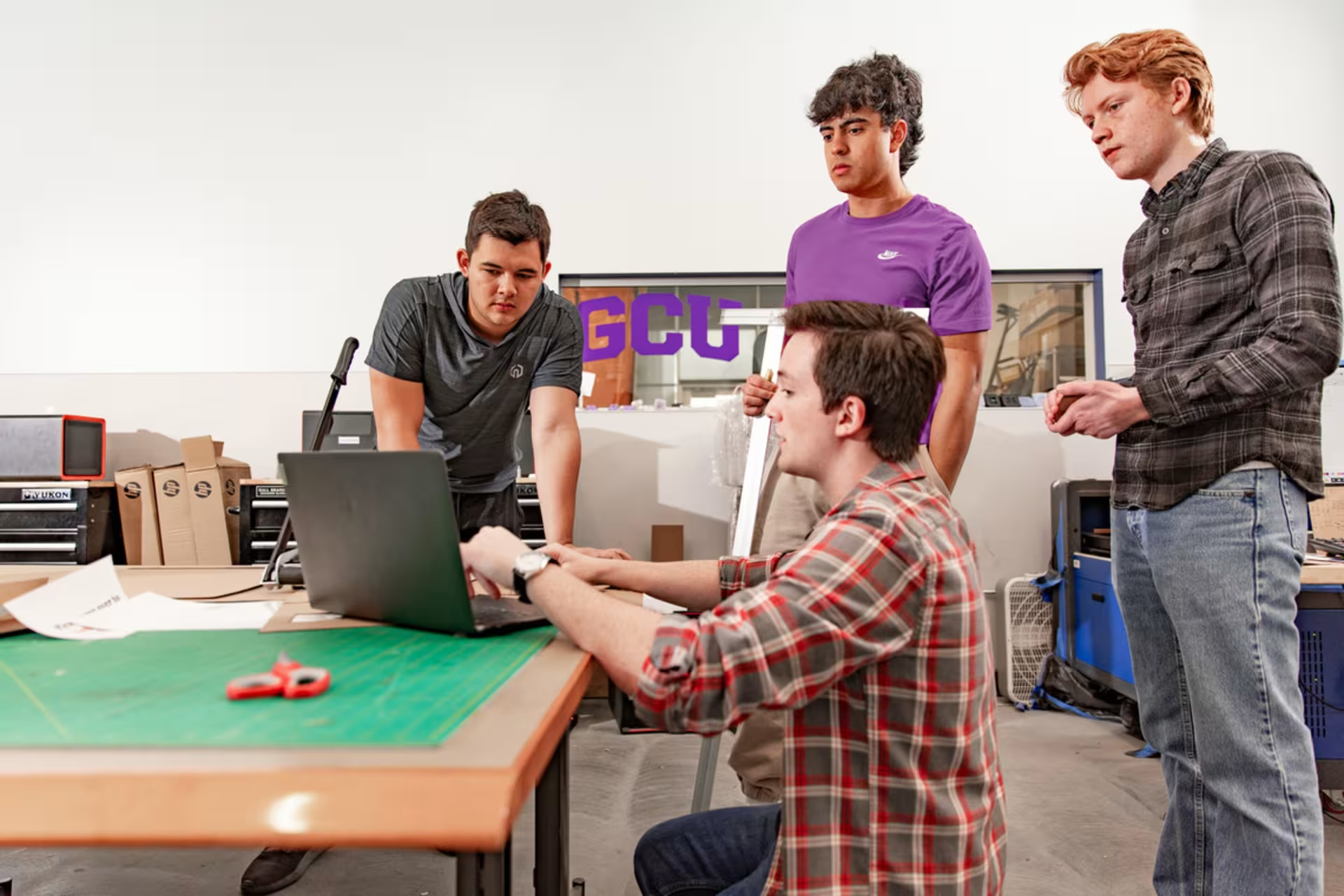
Online Master’s in Software Engineering Degree Program
Deepen Your Technical Knowledge in Software Engineering
The Master of Science (MS) in Software Engineering degree is designed for software engineers and tech-driven professionals who want to deepen their expertise and engage with emerging tools, methods and applications shaping the field. This graduate program can help you build advanced software engineering competencies so you can tackle complex problems and develop innovative solutions.
Through technology-driven coursework and hands-on practice, you can explore how to design software that responds to industry needs while considering public health, safety and welfare — all while using modern techniques, skills and tools that reflect today’s industry expectations.

Online: $600 per credit [More Info]
Up to 12 credits or 1/3 of the total program requirements in transfer (whichever is less)
Credits: Fill out the Lopes Eval to find out what will transfer
Admission Requirements (Master's)
- Undergraduate Degree*
- 2.8+ GPA
OR 2.5+ Unweighted GPA and
- GMAT: 500
- GRE: 300 combined**
Admission requirements may differ based on degree level, program and modality, or transfer status. Some programs of study may require a higher GPA and/or other qualifying criteria for admission. Please review full admission and program requirements in the University Policy Handbook.
* Degree must be from an accredited college or program that has been approved by GCU.
** Combined verbal/quantitative, after August 2011 (1,000 combined verbal and quantitative, prior to August 2011).
Where Innovation Meets Purpose: Why Students Choose GCU
If you want to be involved in all stages of the software development life cycle (SDLC), apply advanced software engineering skills, and explore new technologies that can enhance the quality of life, GCU’s Master of Science in Software Engineering online degree may be a strong fit. In this program, you will be taught how to design and develop the next generation of software products and services used across consumer, industry and government settings.
As a student in the College of Engineering and Technology at GCU, you can benefit from an educational experience that encourages purposeful engagement with technology in a way that serves God and His people. Our STEM programs foster both intrapreneurial and entrepreneurial thinking, supporting learners as they grow into capable, mission-driven leaders within the engineering and technology fields.
The online software engineering program is tailored for busy professionals. This master’s degree offers adaptable scheduling and practical coursework, so you can strengthen your technical expertise while managing work and personal responsibilities.
Faculty in GCU’s College of Engineering and Technology bring strong academic credentials into the classroom. They strive to help students connect theory with practical application through engaging instruction.

Explore Core Software Engineering Topics
The master’s in software engineering online courses can be academically challenging and project-oriented, with a focus on hands-on learning opportunities. You will explore a comprehensive curriculum, covering software engineering principles and practices, design methodologies and project management. You will have the opportunity to apply them to real software engineering projects that can push the boundaries of current capabilities in your industry.
Some of the topics you will be taught in this MS in Software Engineering include:
Software architecture
Software development life cycle (SDLC) methodologies
Software testing
Project management
Security principles
Embedded systems
Careers for Master’s in Software Engineering Graduates
There is a diverse range of roles and work settings to consider after earning a master’s in software engineering, including specialization opportunities. Some areas where software engineers may choose to specialize can include data engineering, project management, artificial intelligence and cybersecurity.(See disclaimer 1)
The MS in Software Engineering degree can help you prepare to pursue the following roles:
Architecture and engineering manager
Database architect
Software developer
Software quality assurance analyst and tester
Engineering teacher (postsecondary)
Estimated job growth for software developers from 2024 through 2034(See disclaimer 2)
Median annual wage for software developers as of May 2024(See disclaimer 3)
Graduate Work Setting Opportunities
A master's degree in software engineering teaches leadership skills to effectively lead teams and manage employees. These leadership skills, coupled with advanced knowledge of principles and practices, can help you prepare for a variety of industries that rely on technological solutions such as software engineering.
As a graduate of the master’s in software engineering degree, you may work in a variety of areas, including:(See disclaimer 4)
Mobile applications
Healthcare
Financial tech
Insurance
Education institutions
Artificial intelligence

Earn Your Masters From an Accredited University
The quality of education you receive is important for working toward your career goals. When you enroll in our program online, you can trust in the academic quality of your program. Our Christian university has been institutionally accredited by the Higher Learning Commission since 1968.
Frequently Asked Questions
If you are considering an MS in Software Engineering degree that explores advanced skills in software design, you may have a number of questions about the program and what it entails. You can use the following frequently asked questions and answers to guide your research and make an informed decision for your future.
What can you do with a master's in software engineering?
Can you earn an MS in Software Engineering online?
What classes do you take in an MS in Software Engineering program?
Program Curriculum
Core Courses

Take the next step in your education with a Master of Science in Software Engineering online at GCU. Start building advanced tech skills today.
- Schulze, J. (2025, June 10). Software Engineer Career Path 2025: Overview, Jobs, and Pay. Coursera. Retrieved November 2025.
- COVID-19 has adversely affected the global economy and data from 2020 to 2023 may be atypical compared to prior years. Accordingly, data shown is effective August 2025, which can be found here: U.S. Bureau of Labor Statistics, Occupational Outlook Handbook, Software Developers, retrieved November 2025.
- The earnings referenced were reported by the U.S. Bureau of Labor Statistics (BLS), Software Developers as of May 2024, retrieved November 2025. Due to COVID-19, data from 2020 to 2023 may be atypical compared to prior years. BLS calculates the median using salaries of workers nationwide with varying levels of education and experience. It does not reflect the earnings of GCU graduates as software developers, nor does it reflect the earnings of workers in one city or region of the country or a typical entry-level salary. Median income is the statistical midpoint for the range of salaries in a specific occupation. It is very unlikely that a median salary will reflect an entry-level salary. It represents what you would earn if you were paid more money than half the workers in an occupation, and less than half the workers in an occupation. It may give you a basis to estimate what you might earn at some point if you enter this career. Grand Canyon University can make no guarantees on individual graduates’ salaries. Your employability will be determined by numerous factors over which GCU has no control, such as the employer the graduate chooses to apply to, the graduate’s experience level, individual characteristics, skills, etc. against a pool of candidates.
- Velazquez, R. (2025, Nov. 14). 200 Companies Hiring Software Engineers. Built-In. Retrieved November 2025.
- U.S. Bureau of Labor and Statistics. (2025, Aug. 28). How To Become a Postsecondary Teacher. Occupational Outlook Handbook. Retrieved January 2026.


